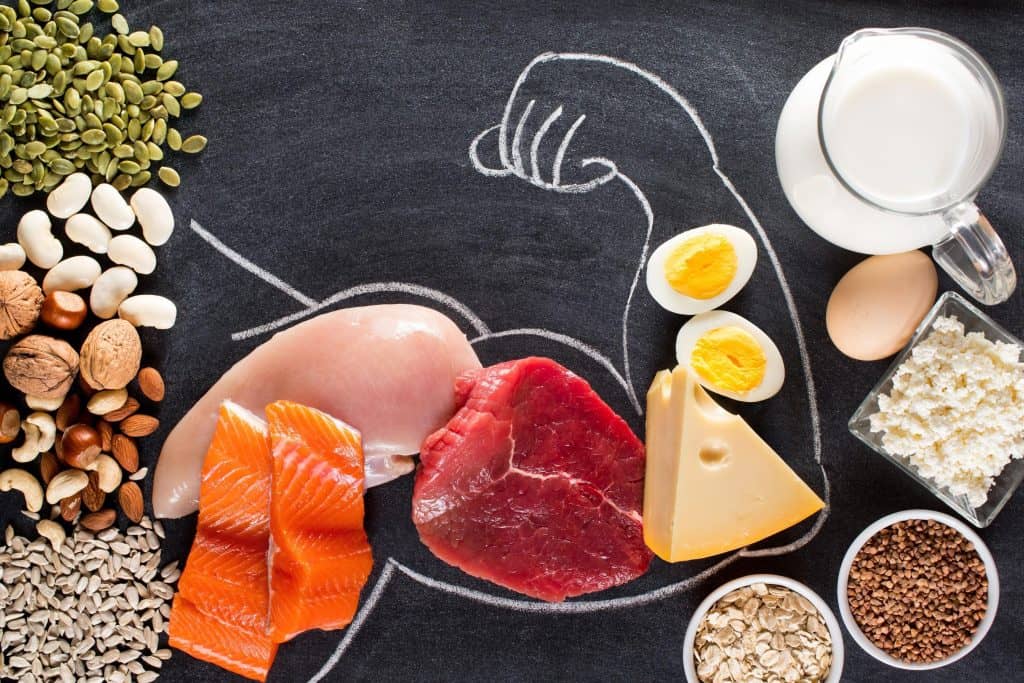Quick Answer: The rate at which people build muscle will depend on a variety of variabilities. One must look at the intensity of the workouts, the amount of protein in their diet, their experience with strength training, and their current age.
One of the most popular questions trainers get asked is:
How long does it take to add some serious muscle?
First, all muscle is serious muscle. If you add a few pounds of muscle over a month or two, you will notice right away. It may take those around you a little bit of extra time to realize you are turning into a beefcake, but they will before long. And once the compliments start piling up, it is going to give you more fuel to the fire to keep on building muscle mass.
However, the million-dollar question should be:
What can I do to add muscle mass in a relatively quick manner?
The absolute truth is that it will take a few research-based strategies that are proven to work to add muscle in a rapid, straightforward way.
You Are What You Eat
We’ve all heard someone say they are going to turn their fat into muscle. Don’t be fooled. You cannot turn fat into muscle. When you are carrying around those ten to twenty pounds of fat around your midsection, how are you going to magically transfer it into muscle and move it up to your biceps and triceps? You aren’t.

Building muscle starts in the kitchen. And if you would like to use a simple, easy-to-follow diet that works, just eat like the cavemen did back in the day. You would be so much healthier (and you don’t need any of those fancy high-priced diets that will leave your wallet empty, either). Those in denial will say, “But cavemen only had a lifespan of about thirty years!” This is correct. But it wasn’t because of their diet. There were diseases, predators, lack of food and clean water, and about a million other things that could end their lives back then. Most of us do not have that problem in today’s society. After all, when was the last time a saber-toothed tiger chased you down the street?
Sticking to a high protein diet, a few fruits and vegetables, avoid the high sugar and highly processed foods, and by drinking water and milk, you will be well on your way to building muscle quickly.Protein is the building block for gaining muscle when combined with weight training. As an added bonus, the more protein you eat, the longer you will feel full so that you will eat less junk food. There is a reason you can eat those high-processed foods such as cookies and chips and never feel full. They have no nutritional value and leave you feeling hungrier. Before long, you have drank and eaten a few thousand unhealthy calories every day with nothing to show for it except more fat accumulating around your waist and perhaps chronic illness.
So how much protein do you need a day to build muscle (with weight training)? Some people will say to eat a gram of protein per day per pound of body weight. To put it simply, if you weigh 200 pounds, you should eat 200 grams of protein daily. This is a great goal to have, but it can be difficult to take in that much protein during the day in the beginning. Start off by aiming for half that amount, and then when you have your go-to high-protein foods, it will become easier.
High Protein Foods to Add to Your Grocery List
One of the most difficult steps to switching over to a high-protein diet is finding foods that you will learn to love and eliminating the unhealthy ones from your fridge. But if you have enough tasty options, you will gladly leave all the junk food behind.

Start off with possible meats you may like. Chicken, turkey, fish, and beef are all great options. And you can prepare them a hundred different ways. Plus, grill out enough food on Sunday, and then store enough healthy meals in the fridge to last through the week. It will only take you a minute to reheat in the microwave when you are tired and hungry and being tempted by the junk food in your pantry.
Other foods that are high in protein are eggs, nuts, beans, beef jerky, greek yogurt, and cottage cheese, just to name a few. Plus, there are some amazing protein shakes out there that will provide you with 30 grams of protein in a minute or two. Just be careful of the amount of sugar and high calories hidden in these drinks. Check the labels!
Strength Training
Building muscle is a combination of strength training with a high-protein diet. Once you have your routine down, the sets and the reps with the proper weight, it won’t be long before you will start attaining some muscle mass.
Hypertrophy is a fancy word for saying as you continually lift weights, you are tearing the muscle fibers in your body. As they quickly heal in a very small amount of time, they regrow slightly bigger than they were before. And this will continue to take place as you strength train consistently.
If you aren’t sure how to go about strength training effectively, approach someone at the gym that is open to guide you in the beginning. If you need to, hire a personal trainer for a few sessions and then take over from there. Plus, there are plenty of workout videos online and fitness apps that will be of great assistance.
Many experienced lifters do strength training every other day. That allows for the person to push hard in the gym and then have a rest day in between. And if your workouts are lasting much longer than an hour, you need to reassess. Perhaps you need to put the phone down like more than half the people in gyms nowadays. Workouts are much more effective when you put the phone down.
Don’t Trust the Scale…Trust the Tape Measure
When building muscle, don’t get discouraged if your scale is not providing the numbers you wanted. Trust the tape measure instead. The great thing about adding muscle mass is that muscle burns calories even while resting. So as you are adding muscle, the stubborn fat will disappear at the same time. You may not see it reflected on the scale at first. Use the tape measure and write down your measurements every week in your journal and take pleasure with these numbers instead.
Women, Don’t Worry!
Women will often fret about becoming too bulky and adding too much muscle whenever they hear someone propose strength training. This will never be the case! There are people who have been working out at the gym for decades and if this idea were true, we would be having 500-pound beasts walking up and down the street. Women have lower testosterone, so building muscle mass is more difficult for them. However, the muscle they will build is a quality muscle that they can be proud of!

So How Long Does It Take to Build Muscle?
To put it simply, there is no easy answer. Some of you may be cursing right now, wanting to know the magic spell, but there are plenty of things you must consider.
- Are you training frequently?
- Are you eating correctly?
- What is your age?
- Are you using the right weight while strength training?
- Are you training with enough intensity?
You need to train hard and eat smartly, as if your life depends on it. If you do this, and you are a beginner, the studies show you may gain good size within two months. It is possible to gain three pounds of muscle during this time, but the real benefit is that you will be losing an immense amount of fat also. Those three pounds of muscle are going to look noticeable.
If you are an experienced strength trainer, by eating high protein and lifting consistently, it is quite possible you could gain four pounds of muscle in a month. Since you already have years of training, you will be lifting more weight than a beginner. Higher weight will help you build muscle mass. If you choose to lift 30 percent less weight than you usually do and concentrate on high-rep sets, you will still build quality muscle because of the constant strain.
Whatever your age or experience, you can achieve great results if you maintain a good diet and strength train with intensity and consistency. Train for three or four hours a week. Not much time when you consider you probably spend 20 hours a week streaming or five hours a day on your phone. For a small commitment, you can become a better version of yourself.
Referenced Resources
Carbone JW, Pasiakos SM. Dietary Protein and Muscle Mass: Translating Science to Application and Health Benefit. Nutrients. 2019 May 22;11(5):1136. doi: 10.3390/nu11051136. PMID: 31121843; PMCID: PMC6566799.
American College of Sports Medicine. Copyright © 2015 American College of Sports Medicine. Created and updated by Donna Cataldo, Ph.D. and Matthew Blair, B.S., and is a product of ACSM’s Consumer Information Committee.
